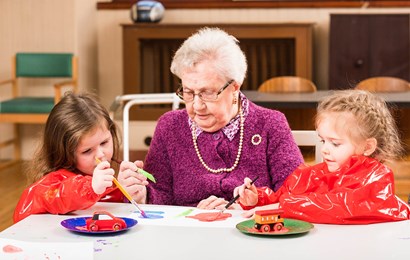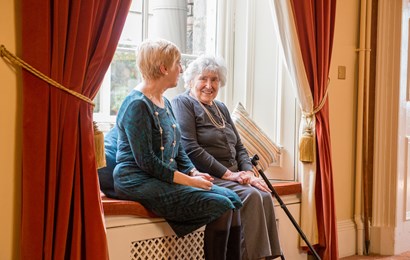
A quality framework for support services (care at home, including supported living models of support)
The primary purpose of this quality framework is to support services to evaluate their own performance. It is then used by inspectors to provide independent assurance about the quality of care and support. By setting out what we expect to see in a high-quality service, we can also help support improvement.
We have also produced a set of self-evaluation tools to support services to assess how well they are doing against key areas from our quality framework and highlight where they need to support improved outcomes for people.
- Quality framework for support services (care at home, including supported living models of support)
- Self-evaluation tools for support services (care at home, including supported living models of support)
Within the framework we have included a scrutiny toolbox, which provides examples of the scrutiny actions we may use in evaluating the quality of provision. The resources below are key practice documents that we think will help care services in their own improvement journey. These are listed under each relevant key question.
Key question 1. How well do we support people’s wellbeing?
Quality Indicator 1.1: People experience compassion, dignity and respect
Key improvement resources
Charter for Involvement – ARC Scotland
Children’s human rights – Children and Young People’s Commissioner Scotland: seven golden rules for participation and other rights information
Good practice guides: Information from the Scottish Human Rights Commission
Guidance document on human rights charter for technology and digital in social care
Guidance for care providers in Scotland using CCTV (closed circuit television) in their services
Health and Social Care Standards
- Rights, risks and limits to freedom
- Human rights in mental health services
- Covert medication
- Working with the AWI Act,
- Decisions about technology.
Practice guide: Involving children and young people in improving services
World Health Organisation – Quality rights: promoting the rights of people with mental health conditions, psychosocial, intellectual, and cognitive disabilities
Quality Indicator 1.2: People get the most out of life
Key improvement resources
General standards for neurological care and support 2019
Indicators of good practice in drug and alcohol services
Information on supporting people with complex needs and sight loss
Let's get active, connected and included resource - SCLD
National guidance for child protection in Scotland (Scottish Government)
Promoting excellence in dementia care (includes people with a learning disability and dementia)
Quality Principles - Standard expectations of care and support in drug and alcohol services
Scottish recovery network – peer support resources
See Hear – framework for meeting the needs of people with a sensory impairment
Supporting personal relationships
Quality Indicator 1.3: People’s health and wellbeing benefits from their care and support
Key improvement resources
Care of people living with HIV
Hospital Passports:
- Autism: My health passport
- Royal Free: Hospital passport - Patients with a learning disability
Intermediate care including reablement
Maximising Recovery, Promoting Independence: An Intermediate Care Framework for Scotland
Medication management procedures for care at home services
Mental Health Strategy for Scotland
Mental Welfare Commission: Good practice guide - covert medication
Notifications about controlled drugs: guidance for providers (2015)
Palliative and end of life care resources
Prompt – assist – administer medication in care settings
Reset and rebuild: sexual health and blood borne virus services - recovery plan
Resources - Eat Well Age Well: Resources about the prevention, detection and treatment of malnutrition and dehydration amongst older adults living at home in Scotland.
Rights, respect and recovery: alcohol and drug treatment strategy
Safe administration of medication: Modules 1-3 (SSSC)
SCLD Healthy Eating Healthy Living Pack
Sexual health and blood borne virus framework 2015-2020
Standards for prevention and management of pressure ulcers
Supporting psychological wellbeing in adults with learning disabilities – an educational framework
Trauma informed practice – National trauma training plan and resources
You are our eyes and ears: Pocket guide supporting consistent monitoring and identifying changes in wellbeing.
Quality Indicator 1.4: People are getting the right service for them
Key improvement resources
Mental Welfare Commission: Supported decision making
Principles of good transitions 3: Scottish Transitions Forum, including the autism and life shortening conditions supplements.
Scottish Social Services Council: Understanding personal outcomes
Self-directed support guidance
Self-directed support implementation plan
Supporting and empowering Scotland’s citizens - National action plan for technology enabled care.
Quality indicator 1.5: People's health and wellbeing is supported and safeguarded by infection, prevention and control practices
Key improvement resources
Communication for people with sensory loss during the Covid-19 pandemic: advice for health and social care staff.
Covid-19: information and guidance for social, community and residential care settings
Healthcare Improvement Scotland: Infection prevention and control standards
Key measures for infection prevention and control: A guide for social care workers providing care in an individual’s home.
National infection prevention and control manual (NICPM)
NIPCM winter 21/22 respiratory infections addendum
Preventing infection in care at home
Records services (except cm) must keep and guidance on notification reporting
Key question 2. How good is our leadership?
Quality Indicator 2.1: Vision and values inform practice
Key improvement resources
Guidance for providers and applicants on aims and objectives
TURAS Leadership and Management Programmes
Quality Indicator 2.2: Quality assurance and improvement is led well
Key improvement resources
Adults with incapacity: template policy for adult services
Care Experience Improvement Model (CEIM)
Learning from adverse events through reporting and review: A national framework for Scotland 2019
National Occupational Standards (NOS)
NES Quality improvement learning and tools
SCLD – Using scrutiny to drive outcomes and associated resources
SSSC - Leadership development activities
Supporting improvement – It’s everyone’s business
The model for improvement and associated resources
Quality Indicator 2.3: Leaders collaborate to support people
Key improvement resources
General Data Protection Regulation (GDPR) guidance
Information Commissioner’s guide to data protection, including GDPR
Partnerships and Co – conversation openers
Quality Indicator 2.4: Staff are led well
Key improvement resources
Achieving effective supervision
Everyday leadership from the frontline
Guidance on development of policy and procedure
Key question 3. How good is our staff team?
Quality Indicator 3.1: Staff have been well recruited
Key improvement resources
Safer recruitment through better recruitment
The national health and social care workforce plan: part two
Values based recruitment toolkit:
Quality Indicator 3.2: Staff have the right knowledge, competence and development to support people
Key improvement resources
Achieving effective supervision – IRISS insight
Codes of practice for social service workers and employers
Common core skills and national occupational standards
Employer responsibilities–supporting staff with registration
Frequently asked questions about SSSC registration
Prepping for practice – induction guidance 3.2
Social care induction framework
Step into leadership - Supervision
The framework for continuous learning in social services
Transforming psychological trauma: A knowledge and skills framework for the Scottish workforce
Quality Indicator 3.3: Staffing arrangements are right and staff work well together
Key improvement resources
Key question 5. How well is our care planned?
Quality Indicator 5.1: Assessment and personal planning reflects people’s outcomes and wishes
Key improvement resources
Children and Young People (Scotland) Act 2014, asp 8:
Guide for providers on personal planning
Healthcare Improvement Scotland - Guidance on anticipatory care planning
Helen Sanderson - Person centred support planning information
Mental Welfare Commission guidance:
- personal plans
- advance statements
- power of attorney
- supported decision making
Scottish Independent Advocacy Alliance – companion guidelines
Talking points – joint improvement team
Think local act personal – personalised care and support planning tool
Understanding personal outcomes
Quality Indicator 5.2: Carers, friends and family members are encouraged to be involved
Key improvement resources
Carers Trust: Triangle of care, carers included
Mental Welfare Commission – Carers and confidentiality good practice guide
We held a webinar on 1 June 2022 which explained the changes made within the updated Quality framework for support services (care at home including supported living models of support), and also introduced staff to the self-evaluation toolkit which had emerged from the learnings of our previous work on Covid-19 Self-evaluation toolkit for key question 7 and from discussions with services and inspectors.
Quality improvement programmes and topics
Quality improvement activity led by the Care Inspectorate, including recent practice resources and initiatives
Care at home
Care at home makes sure that as many people as possible are supported in their own homes. The care at home service can touch on all aspects of your daily life in your own home
Adults and older people
An overview of major developments in policy areas relating to services for adults and older people



